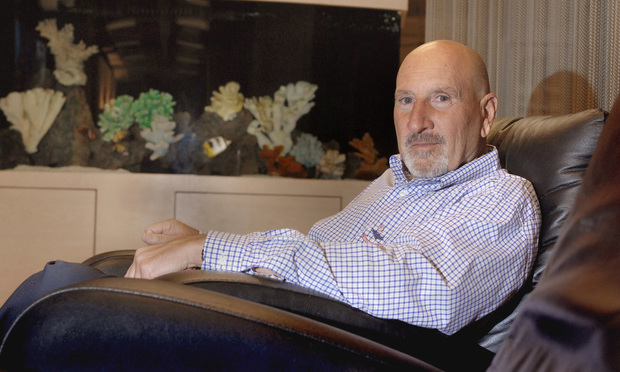Quinn Emanuel to Appeal Ruling Disqualifying It From Repping Victims in California Wildfire Cases
Quinn Emanuel has appealed a June 14 ruling disqualifying it from representing victims of a Southern California wildfire after concluding the firm obtained confidential information from defendant Southern California Edison.
June 20, 2019 at 08:00 PM
5 minute read
The original version of this story was published on The Recorder
 Kenneth Chiate, Quinn Emanuel. (Photo: Jamie Rector)
Kenneth Chiate, Quinn Emanuel. (Photo: Jamie Rector)
Quinn Emanuel Urquhart & Sullivan plans to appeal a judge's order disqualifying it from representing 137 victims of a massive wildfire in Southern California last fall.
On June 14, Los Angeles Superior Court Judge William Highberger found that Quinn Emanuel's lawyers, in three separate communications with attorneys for electric utilities company Southern California Edison more than a year ago, had obtained confidential information with a “substantial relationship” to the wildfire cases now pending. Edison “faces substantial prejudice” without disqualifying Quinn, Highberger wrote.
“And, ultimately, the integrity of the legal system is implicated by Quinn's conduct,” he wrote. “If left unchecked, the public nature of Quinn's side-switching would likely undermine the public's trust in the scrupulous administration of justice and integrity of the bar.”
Quinn Emanuel plans to appeal the ruling.
“We disagree with the court's ruling,” said Quinn Emanuel partner Kenneth Chiate in Los Angeles. “We believe there was no material confidential communication in any of the communications that were at issue, and the court decided otherwise, and we think that that was wrong.”
Southern California Edison, represented by Los Angeles-based Hueston Hennigan, provided a statement: “SCE is pleased with the court's ruling, which ensures proper protection of SCE's confidential information while leaving parties who had retained Quinn Emanuel to be competently represented by Quinn's co-counsel, which was not disqualified.”
Quinn's co-counsel, Gregory Waters at Engstrom, Lipscomb & Lack of Los Angeles, did not respond to a request for comment.
The disqualification comes about a month after a federal magistrate judge in San Francisco booted Quinn Emanuel from an antitrust case against Uber Technologies Inc., its former client.
Quinn, which has represented San Diego Gas & Electric and Pacific Gas & Electric Co. (PG&E) in prior California wildfire litigation for the past decade, filed three lawsuits over the Woolsey fire, including one on behalf of former U.S. Congressman David Dreier, who lost his Malibu home. The Woolsey fire destroyed 500 properties and killed three people in Southern California.
Last month, Southern California Edison filed a motion to disqualify Quinn Emanuel on grounds that it had obtained confidential information from “strategy calls” with Hueston Hennigan and at a December 2017 meeting that also involved former Quinn clients San Diego Gas & Electric and PG&E. Also, that same month, Quinn interviewed to represent Southern California Edison in litigation tied to a 2017 wildfire that hit Southern California.
Quinn, opposing the motion, insisted that it did not receive confidential information, particularly from the pitch meeting, which lasted less than an hour, and called the disqualification motion nothing more than a tactical strategy. Plus, the firm also never represented Southern California Edison, and used screening and ethical walls as prophylactic measures.
But Highberger, in his order, said he could presume that Quinn got confidential information—whether Edison could prove it or not.
“Though SCE was not required to prove that Quinn actually obtained SCE's confidential and privileged information, SCE has persuasively shown that material confidential information was provided to lawyers of Quinn,” he wrote.
At the joint 2017 meeting with all the utilities, for example, Quinn gave a presentation on “inverse and negligence claims in wildfire matters,” the judge wrote. And phone calls in 2018 between Quinn's lawyers and Hueston Hennigan discussed confidential legal strategies.
At the 2017 pitch meeting to represent Edison, Quinn presented a slide deck called “Potential Wildfire Litigation Strategies for Southern California Edison Company,” including how to address inverse condemnation and class actions. Quinn's lawyers said they did not recall obtaining confidential information at that meeting, but Edison's in-house attorneys, the judge wrote, took “contemporaneous notes.”
The judge found “significant factual overlap” between the wildfire litigation that was the subject of the 2017 pitch meeting and the Woolsey fire, both of which implicated Southern California Edison.
“In short,” he concluded, “the factual issues that overlap are many, which is sufficient for purposes of the substantial relationship test.”
But the judge never heard exactly what the confidential information was that Quinn allegedly obtained, Chiate said.
“He believes it was material and confidential without knowing what it was, and concludes that by implication if it was said in this setting, it must have been confidential and material,” Chiate said. “We said you can't make that conclusion without hearing what it was.”
Chiate also flagged a footnote that Highberger wrote, stating: “The court does believe that attorney Chiate was proceeding in subjective good faith (believing that he and his Quinn colleagues had not been shown anything material in confidence), but that does not change the outcome.”
“To me, that tells you a lot,” Chiate said. “It means he interprets the setting differently than we interpreted the setting.”
This content has been archived. It is available through our partners, LexisNexis® and Bloomberg Law.
To view this content, please continue to their sites.
Not a Lexis Subscriber?
Subscribe Now
Not a Bloomberg Law Subscriber?
Subscribe Now
NOT FOR REPRINT
© 2025 ALM Global, LLC, All Rights Reserved. Request academic re-use from www.copyright.com. All other uses, submit a request to [email protected]. For more information visit Asset & Logo Licensing.
You Might Like
View All
Some Thoughts on What It Takes to Connect With Millennial Jurors

Litigators of the Week: A Knockout Blow to Latest FCC Net Neutrality Rules After ‘Loper Bright’
Trending Stories
- 1Uber Files RICO Suit Against Plaintiff-Side Firms Alleging Fraudulent Injury Claims
- 2The Law Firm Disrupted: Scrutinizing the Elephant More Than the Mouse
- 3Inherent Diminished Value Damages Unavailable to 3rd-Party Claimants, Court Says
- 4Pa. Defense Firm Sued by Client Over Ex-Eagles Player's $43.5M Med Mal Win
- 5Losses Mount at Morris Manning, but Departing Ex-Chair Stays Bullish About His Old Firm's Future
Who Got The Work
J. Brugh Lower of Gibbons has entered an appearance for industrial equipment supplier Devco Corporation in a pending trademark infringement lawsuit. The suit, accusing the defendant of selling knock-off Graco products, was filed Dec. 18 in New Jersey District Court by Rivkin Radler on behalf of Graco Inc. and Graco Minnesota. The case, assigned to U.S. District Judge Zahid N. Quraishi, is 3:24-cv-11294, Graco Inc. et al v. Devco Corporation.
Who Got The Work
Rebecca Maller-Stein and Kent A. Yalowitz of Arnold & Porter Kaye Scholer have entered their appearances for Hanaco Venture Capital and its executives, Lior Prosor and David Frankel, in a pending securities lawsuit. The action, filed on Dec. 24 in New York Southern District Court by Zell, Aron & Co. on behalf of Goldeneye Advisors, accuses the defendants of negligently and fraudulently managing the plaintiff's $1 million investment. The case, assigned to U.S. District Judge Vernon S. Broderick, is 1:24-cv-09918, Goldeneye Advisors, LLC v. Hanaco Venture Capital, Ltd. et al.
Who Got The Work
Attorneys from A&O Shearman has stepped in as defense counsel for Toronto-Dominion Bank and other defendants in a pending securities class action. The suit, filed Dec. 11 in New York Southern District Court by Bleichmar Fonti & Auld, accuses the defendants of concealing the bank's 'pervasive' deficiencies in regards to its compliance with the Bank Secrecy Act and the quality of its anti-money laundering controls. The case, assigned to U.S. District Judge Arun Subramanian, is 1:24-cv-09445, Gonzalez v. The Toronto-Dominion Bank et al.
Who Got The Work
Crown Castle International, a Pennsylvania company providing shared communications infrastructure, has turned to Luke D. Wolf of Gordon Rees Scully Mansukhani to fend off a pending breach-of-contract lawsuit. The court action, filed Nov. 25 in Michigan Eastern District Court by Hooper Hathaway PC on behalf of The Town Residences LLC, accuses Crown Castle of failing to transfer approximately $30,000 in utility payments from T-Mobile in breach of a roof-top lease and assignment agreement. The case, assigned to U.S. District Judge Susan K. Declercq, is 2:24-cv-13131, The Town Residences LLC v. T-Mobile US, Inc. et al.
Who Got The Work
Wilfred P. Coronato and Daniel M. Schwartz of McCarter & English have stepped in as defense counsel to Electrolux Home Products Inc. in a pending product liability lawsuit. The court action, filed Nov. 26 in New York Eastern District Court by Poulos Lopiccolo PC and Nagel Rice LLP on behalf of David Stern, alleges that the defendant's refrigerators’ drawers and shelving repeatedly break and fall apart within months after purchase. The case, assigned to U.S. District Judge Joan M. Azrack, is 2:24-cv-08204, Stern v. Electrolux Home Products, Inc.
Featured Firms
Law Offices of Gary Martin Hays & Associates, P.C.
(470) 294-1674
Law Offices of Mark E. Salomone
(857) 444-6468
Smith & Hassler
(713) 739-1250








